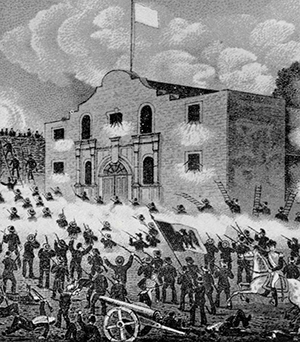March 06
Published in On this Day listing-

Above: The Battle of the Alamo (1836)—at least nine men born in Ireland fought and died in the siege.
1836 The Siege of the Alamo ended when the forces of General Antonio López de Santa Anna overran the former Franciscan mission near San Antonio, Texas, which 184 settlers had heroically defended for thirteen days. The final assault by a Mexican army of between 1,800 and 6,000 men lasted less than an hour, and on Santa Anna’s orders no prisoners were taken. The commander at the mission, the youthful Col. William B. Travers (26), who had Scots-Irish connections, died fighting to the end, but the legendary slave-smuggler and frontiersman Jim Bowie (c. 40) saw little of the action. Bedridden in a fevered daze with typhoid throughout the siege, he still managed to fire a single pistol shot at the Mexican troops who bayoneted him to death. The fate of that other legend, Col. David ‘Davy’ Crockett (49), however, is still contested. A descendant of a family from Castlederg, Co. Tyrone, that had emigrated to America during the great, mainly Presbyterian, migration of the early eighteenth century, it was traditionally believed that he died in a heroic last stand, still wearing his racoon-tailed hat, surrounded by the corpses of seventeen Mexicans that he had killed, as portrayed by John Wayne in the movie The Alamo (1960). In recent years, however, new evidence has come to light that strongly suggests that he surrendered and was subsequently executed. What we do know is that at least nine men born in Ireland fought and died in the siege. In a museum on the battle site, where the flags of every state and country represented amongst the defenders are displayed, their names, most of which suggest an Ulster Presbyterian background, are inscribed under an Irish Tricolour (sic).
- 1939 Thomas Casement (76), Boer War and First World War veteran and brother of Sir Roger Casement, was found drowned at Baggot Street bridge, Dublin.
- 1988 Three members of an IRA active service unit were shot dead by the SAS in Gibraltar (see 16th).
- 1987 The Herald of Free Enterprise, a roll-on-roll-off ferry, capsized moments after leaving the Belgian port of Zeebrugge, killing 193 passengers and crew.
- 1918 John Redmond (62), leader of the Irish Parliamentary Party since 1900, died.
John Redmond (62), leader of the Home Rule Party since 1900, died. - 1845 Amongst the many theories on what inspired the character Dracula is that Bram Stoker was greatly influenced by his older brother’s medical textbooks relating to rare and unusual diseases, one of which was a hereditary blood disorder called porphyria. Sufferers of this condition would have extreme sensitivity to light and would remain indoors during daylight hours, only venturing out at night. Their lips and gums often receded, making the incisors prominent. In extreme cases they succumbed to a cataleptic-like state in which they appeared to be dead, only to recover later in a vault or coffin. And they were allergic to garlic. Sir William Thornley Stoker, born on 6 March 1845, was the eldest of seven children of Abraham Stoker, a senior civil servant in Dublin Castle, and Charlotte Thornley, a social reformer from County Sligo. Charlotte was very ambitious for her family and at the time of her death in 1901, though proud of Bram’s achievement in publishing a novel which would be read by more people worldwide than any book other than the Bible, was convinced that William would be the success of the family. After all, he was president of the Royal College of Surgeons. President too of the Royal Academy of Medicine in Ireland, where he was professor of anatomy, Sir William was an expert in abdominal and cranial surgery and neurosurgery and the first to perform a variety of modern procedures in Ireland. He also had a keen interest in art, and his magnificent home in Ely Place, where he entertained the great and the good, was packed with paintings and objets d’art. He died in July 1912, just six weeks after Bram
- 1923 Five National Army soldiers were killed at Knocknagoshel, Co. Kerry, when an IRA mine exploded whilst they were investigating what they thought was an arms dump.
- 1924 The Army Mutiny: Free State army officers delivered an ultimatum to the government demanding the removal of the army council and the suspension of demobilisation.
- 1974 The sixteen-week British miners’ strike came to an end after a 35% pay offer by the new Labour government.
















